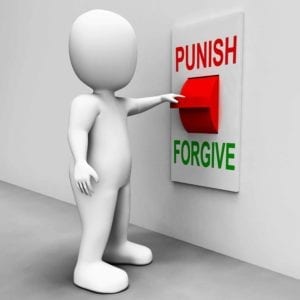… But You’re Getting Divorced Anyway!

While I would never criticize anyone’s values or question their religious beliefs, if there is one thing I’ve learned by practicing divorce law for 20+ years, it’s this:
It doesn’t matter what you believe. (Sorry!) Divorce happens.
If You Don’t Believe in Divorce, How Can it Happen to You?
Every state in the U.S. now recognizes some form of no-fault divorce. That means that, if your spouse wants a divorce and you don’t, you’re still going to end up divorced.
You can make the divorce process take longer. You can make it cost more. But, you can’t stop it. Period.
Of course, it’s tempting to think that you can talk your spouse out of getting divorced if you just try hard enough. Maybe you think that getting your priest/pastor/rabbi/religious leader involved will help bring your spouse to his or her senses. Maybe you believe that if you can just get your spouse to go to marriage counseling with you, all will be well again.
Maybe it will. By all means, before you throw in the towel on your marriage, you should try everything in your power to save your relationship.
Just understand one thing: There are some things in life that are beyond your control.
Sometimes, you can’t save your marriage, no matter what you want or what you do.
Yes, that sucks. And yes, it feels unfair. But living in denial only makes your divorce hurt more.
It won’t stop you from being divorced.
What if You are the One Who is Thinking About Divorce?
The only thing worse than having a spouse who wants a divorce when you don’t want one is being the spouse who is considering divorce when you don’t believe in divorce yourself!
How can that be? How is it possible that you could be the one thinking about divorce when you don’t even believe in divorce? (Or, at least, you THOUGHT you didn’t believe in divorce!)
The answer is simple: life is complicated.
Maybe you are in an abusive relationship. Maybe your spouse has become an alcoholic or a drug addict. Or maybe your spouse has developed a mental illness.
Whatever you’re facing when you’re considering divorce, know this much: life happens. It happens in ways we can’t predict. It happens in ways that aren’t comfortable. Sometimes it happens in ways that challenge our beliefs and force us to grow.
While that may not be pleasant, it’s not wrong. It actually happens all the time.
What’s more, if you’re willing to dig into your beliefs you’ll find something astonishing. You can change your beliefs.
When you change your beliefs, you change your life.
That change can be “good” or “bad.” Or, it can just be change – change without any value judgment attached to it.
How to Handle a Divorce You Don’t Believe In
When getting divorced doesn’t fit with your beliefs about how life is “supposed” to be, you feel conflicted. That’s normal. It’s uncomfortable – but it’s normal!
The best way, maybe the only way, to handle that kind of conflict reasonably well requires you to do two things:
1. Be Kind; and
2. Forgive.
What Does Kindness Have to Do With It?
The internal stress that comes from living in conflict with your beliefs can be HUGE!
As humans, we need consistency. Our idea of who we are MUST be consistent with who we believe we are. So, when our lives conflict with our beliefs, we experience tremendous pain. No one can live in that state for a long time.
Either we have to change our beliefs to match our new reality, or we have to twist our view of reality so that it conforms to our old beliefs. One way or another, something has got to give.
That’s where kindness comes in.
When we’re going through something as emotionally traumatic and totally life-changing as divorce, a little kindness goes a long way.
Who do we need to be kind to? We need to be kind to everyone involved in our divorce … that includes our spouse AND ourselves! (Yes. You need to be kind to your spouse even though that’s pretty much the LAST thing you feel like doing!)
Why Being Kind to Your Spouse Helps YOU!
Very few people want to treat their spouse kindly during a divorce. It’s hard to be kind to someone who just broke your heart and shattered your dreams. That totally makes sense.
But, at the end of your divorce, your spouse will be gone. (Or, at least, your spouse won’t be living with you anymore. If you have kids together, your spouse will never be completely out of your life.) The person who will be left is you. You have to live with yourself forever. You also have to live with the memory of how you went through your divorce – how you acted and what you did.
When you feel like you acted with kindness and integrity in a difficult (or maybe even horrible!) situation, you feel really good about yourself. That makes healing from your divorce easier. It allows you to move on with your life faster. That’s why, as counterintuitive as it is, being kind to your spouse (even when s/he clearly doesn’t deserve it!) helps YOU.
Being Kind Extends to You Too!
Your spouse isn’t the only one who needs a little kindness during your divorce. You need – and deserve – the same kindness too! That means that you need to learn to be kind to yourself.
Unfortunately, kindness is something most of us are used to giving to everyone EXCEPT ourselves.
We all have a tendency to beat ourselves up when we don’t live up to our ideals. We judge ourselves. We feel like a failure.
Unfortunately, that feeling is all too normal. But just because it may be normal, doesn’t mean we have to live with it. We can give ourselves a break and show ourselves the same kindness and compassion we would show to a stranger who was going through a similarly rough time.
The bottom line is this. Going through a divorce is punishment enough. Adding to your pain by beating yourself up accomplishes nothing. You will feel better – and do better – if you treat yourself kindly during this difficult life transition.
 Forgiveness
Forgiveness
Not only do you need to do your best to be kind to yourself and your spouse, but you also need to try to open your heart and learn to forgive both of you, too. (Yes. I know. You don’t feel like doing that either!)
A lot of people don’t want to forgive their spouse. They think that forgiving their spouse excuses their spouse’s bad behavior.
It does not.
Contrary to popular opinion, though, forgiveness is not something that you do for your spouse. It’s something you do for yourself. It’s what you do to free yourself of the ties that still bind you to your spouse.
Whether you choose to believe it or not, the longer you stay angry at your spouse, the longer your spouse controls you and your emotions. The moment you forgive and let go, you become free. Once you reach the point where you truly don’t care what your spouse says or does anymore, you take back your life.
Another misconception people have about forgiveness is that they think forgiveness means weakness. The truth is, forgiveness is a sign of strength.
Weak people don’t forgive because forgiving is hard. Forgiving a spouse who gave up on your marriage and dashed all of your dreams is hard. Forgiving someone who violated every value that you ever held dear is hard.
That’s why it takes a strong person to forgive their ex. It takes an even stronger one to forgive themselves.
Forgiving Ourselves
While this may seem surprising, forgiving ourselves often takes even more strength than forgiving our ex! We are our own biggest critics. We are harder on ourselves than on anyone else.
Yet, true forgiveness MUST start with ourselves. You can’t give what you don’t have. You can’t forgive your ex until you first forgive yourself. You also can’t begin to heal the tremendous pain that divorce causes until you forgive yourself.
It is only through forgiveness that we can grow.
Yet “forgiving ourselves” also presents us with a potential trap. We feel like we “should” forgive ourselves. So we try to force ourselves to “forgive” before we’re ready. When we do that we end up pretending we’ve done something we haven’t done at all.
Unfortunately, fake forgiveness doesn’t work. If you want to be free, you’ve got to work through your anger and legitimately let it go. You’ve got to be willing to truly forgive – and that takes time. But taking the time is the only way to achieve the level of forgiveness that will let you heal and move on.
 Divorce Happens
Divorce Happens
No one gets married thinking that they’re going to get divorced. Yet, that’s exactly what happens to so many people. It happens to good people. It happens to people who are just like you.
If you’re facing a divorce that you don’t want but can’t stop, take heart. You will get through this! Your life will go on. Even if you were the one who initiated the divorce you never thought you would want, you will get through it. Your life will go on too.
The good news is that, regardless of what your beliefs are about divorce, you have the power to create an amazing life after your divorce is over. To get there, all you need to do is two things:
- Be kind; and
- Forgive.
The rest will come.
____________


 Forgiveness
Forgiveness Divorce Happens
Divorce Happens
I appreciate you for writing this. I emailed this to my wife, because that’s exactly how I feel. I’m ready for a divorce and she’s not.
Thanks Again.
You’re welcome.
Karen
I’m here to cry bullshit on the whole charade.
Forgiveness isn’t necessary for healing.
Forgiveness is not necessary to “move on.”
It’s not even necessary in order to feel compassion or love for someone.
It’s not necessarily healthy.
In fact, more often than not, in the instances when forgiveness is prescribed (severe betrayal, severe hurt/abuse, severe tragedy, severe trauma), it’s actually harmful to the person needing to heal. There’s a reason why anger is listed as one of the main steps in grief—it’s important! Getting angry, feeling sad, holding someone else accountable, they’re all part of “moving on.”
What does a statement like “you just need to forgive” do? It heaps more guilt on the person who is experiencing those emotions—those necessary emotions—by making them feel like they’re wrong or unhealthy or weak for experiencing them. In other words, it’s blaming the victim, encouraging them to ignore their own needs and cater to another person’s desires.
It denies the mind’s natural way of healing itself.
You don’t get past the anger by suppressing it. You don’t move through grief by denying it. The only way to get through those difficult aspects of healing is by claiming the right to feel them.
While you didn’t share any details of your story, clearly, you have been through significant emotional pain. I appreciate your opinion.
I wonder whether holding onto your anger (which you are certainly entitled to do) is helping you to get past your pain and be happy. If so, that’s fabulous! You don’t need to read any further.
However, if you are like most of the rest of us, holding on to anger and negativity only holds you down.
Research has shown that holding onto a grudge depletes our cognitive energy. It also raises the level of stress hormones in our body and can contribute to weight gain. Holding onto anger physically weighs you down.
Forgiveness, on the other hand, helps lighten your load. It makes you feel better, physically and emotionally.
According to Dr. Frederick Luskin PhD, author of Forgive for Good: A Proven Prescription for Health and Happiness, forgiveness leads to increased physical vitality and hope, greater optimism and improved conflict resolution skills. Forgiveness also decreases hurt, anger, depression and blood pressure.
Of course, no one is advocating being a doormat. Forgiveness doesn’t mean that you should condone someone else’s bad behavior. It does not mean that you should deny your anger or your hurt. It also doesn’t mean that you deny your feelings.
Forgiveness also has nothing to do with blame. It is not something that you “should” do because someone else thinks it is right. It is always a personal choice.
Forgiving someone also does not mean that you are wrong, unhealthy, or weak. As I said in the article. “Forgiveness takes strength.”
When you forgive someone who has done you wrong, you don’t deny your feelings. You work through them and start to get past them. You start reclaiming your own power. You start getting control over your emotions and improving your mental and physical health. You start taking back your life.
In the final analysis, though, forgiveness is a choice. What you choose is up to you.
I wish you the best.
Karen
Karen Covy, a “professional” who can’t deal with differing opinions. Not at all surprising.
Sometimes, it takes me awhile to respond. I’m doing my best.
Karen
Agree with the other guy. If you’re facing someone who is a narcissist, you need every bit of anger you can muster, and if you’re with a narcissist, you’re the only person who can “love” them. Studies show that second, and third marriages do not stand any better chance of holding together more than the first one. The courts are getting paid to promote celibacy? Bad moves that won’t ever heal? But things would heal…in fact–if people kept together after a divorce, they’d find that those changes they wanted were capable of happening It’s all drama. It’s all posture. The sad part is those things that you really need you can get. They’re very possible. Instead of having a divorce, why not issue restraining orders on those who is having an affair? It would maybe make your spouse not visit you, but at least your finances are firmly tied. If someone is abusing you, why not send them to jail? When they come back I don’t think they’ll do that anymore. If one party isn’t working, why force both parties to suddenly hold down separate rent, utilities, & private insurance? How does a court help anyone get back on their feet when all the money is going supposedly to a standard of living or a kid? If there are children involved, why make a child choose between a dad or a mom? No fault was adopted by Reagan who stole the idea from the Russian communists. Since when have communistic ideas ever turned out well? You should be angry at your divorce, and you should be angry at the people with guns who make it happen.